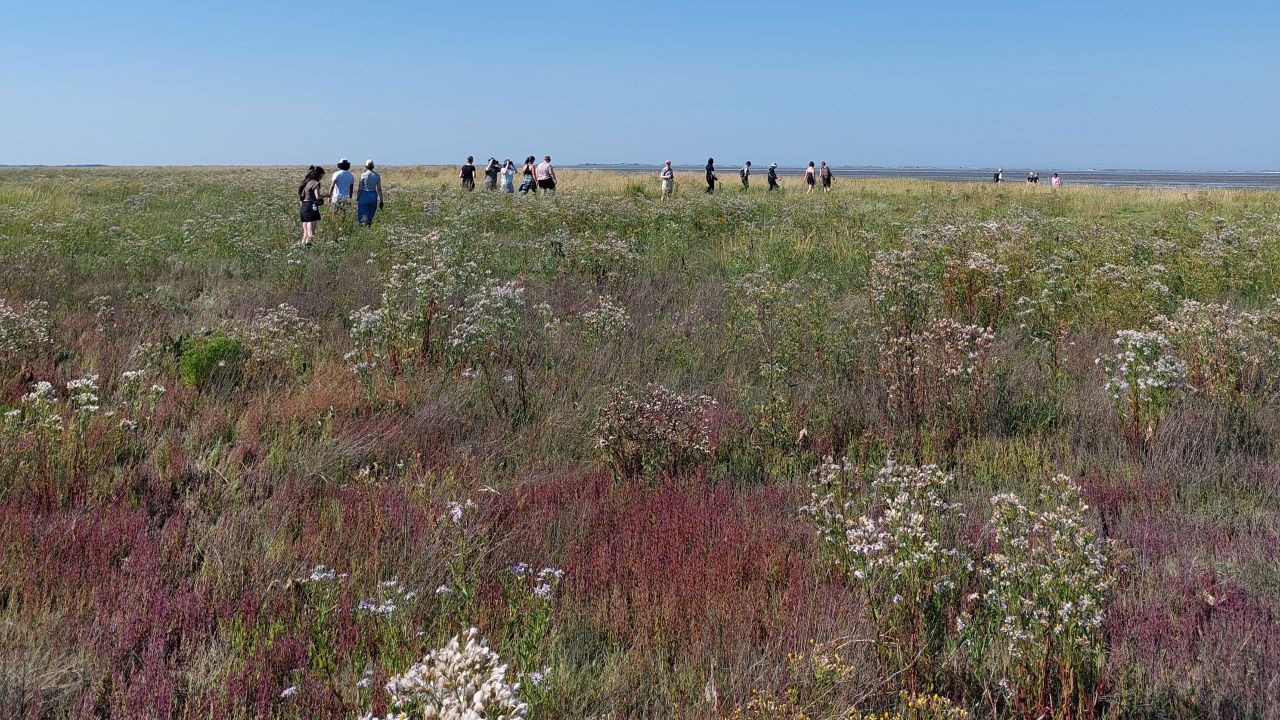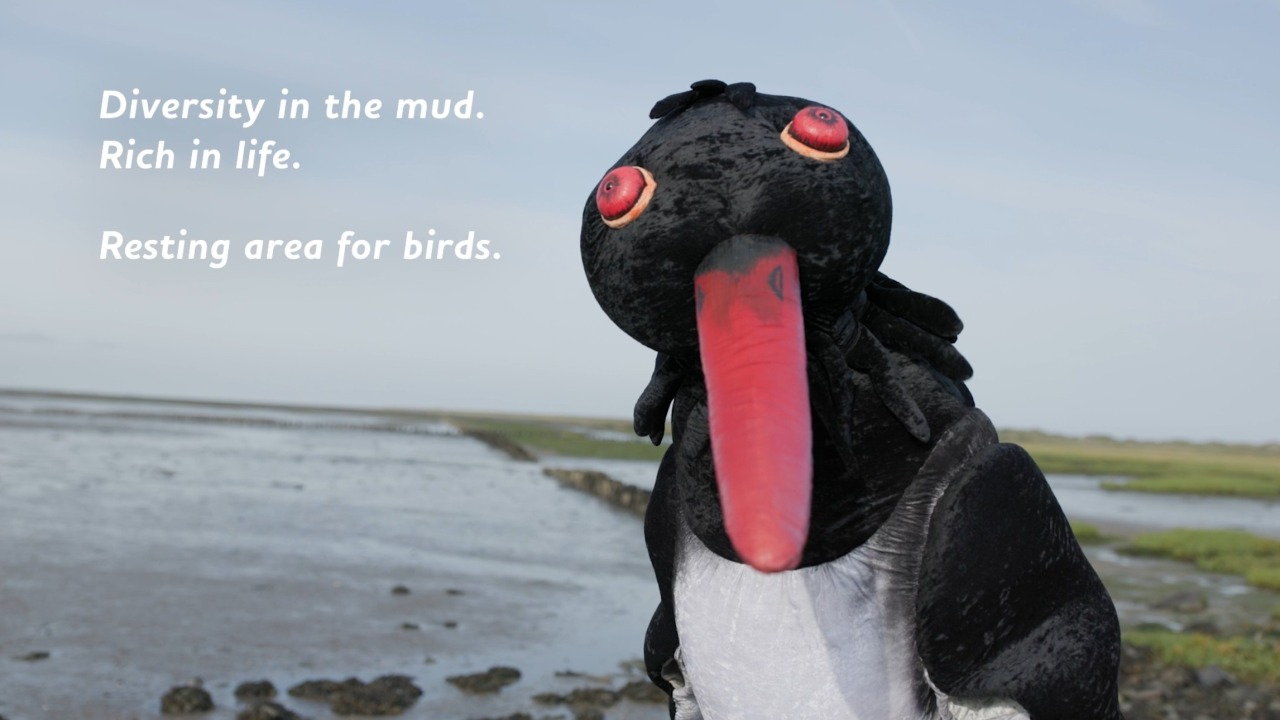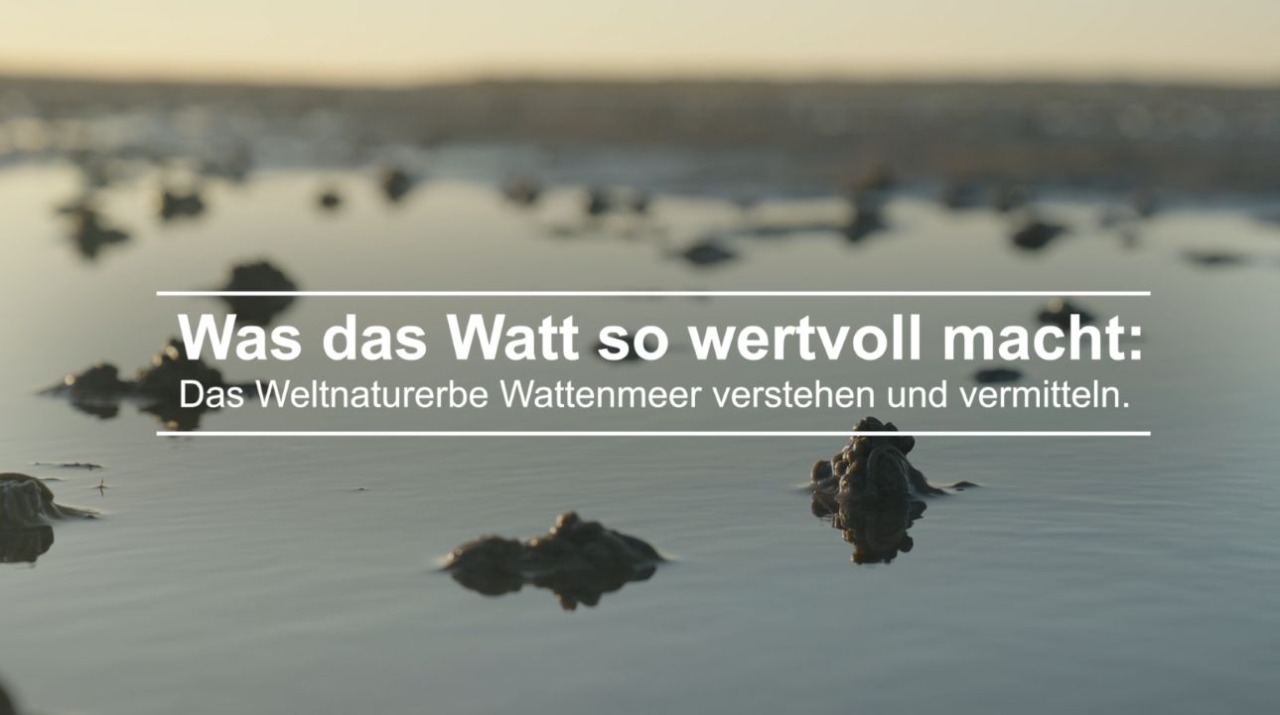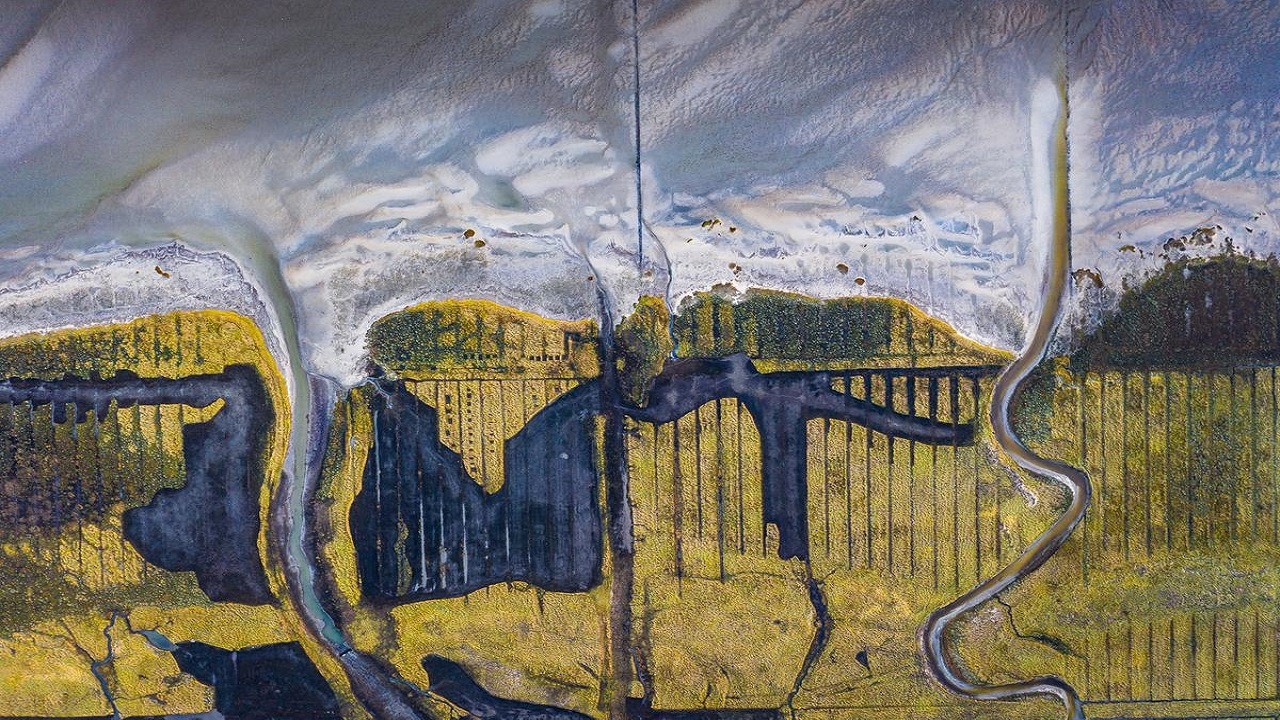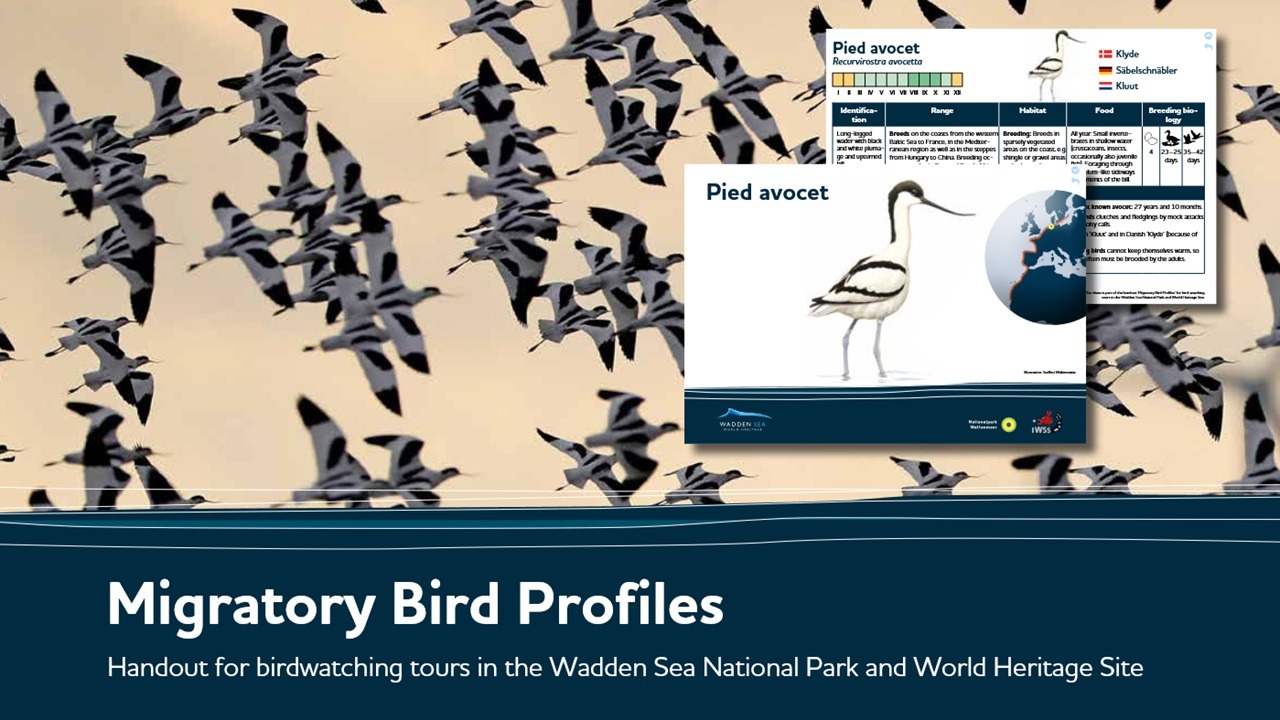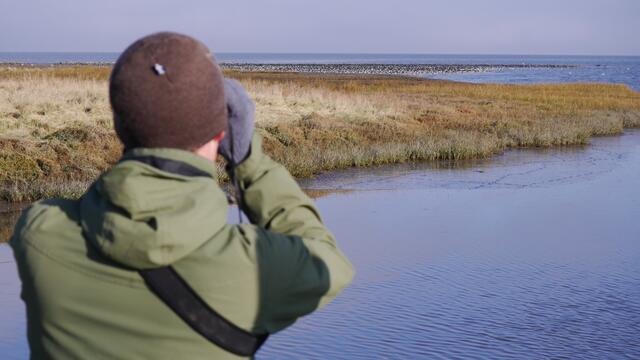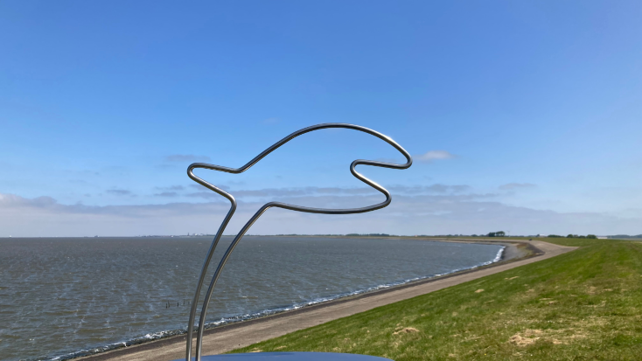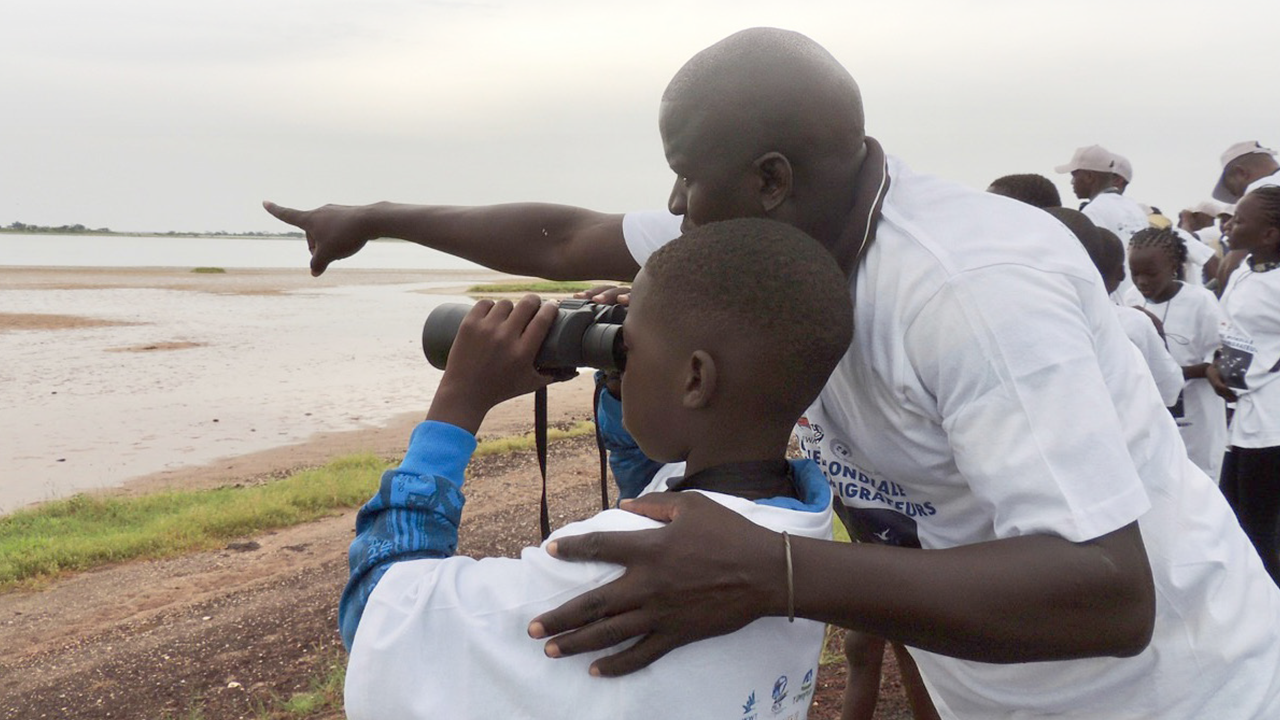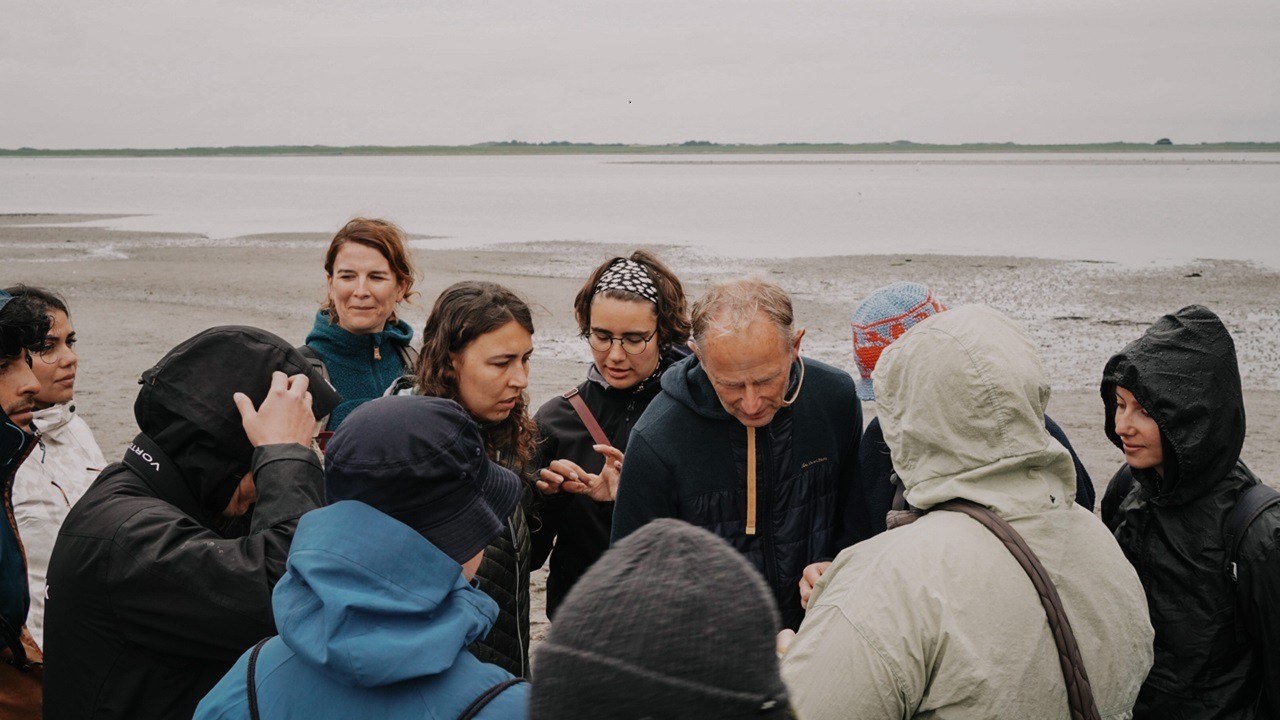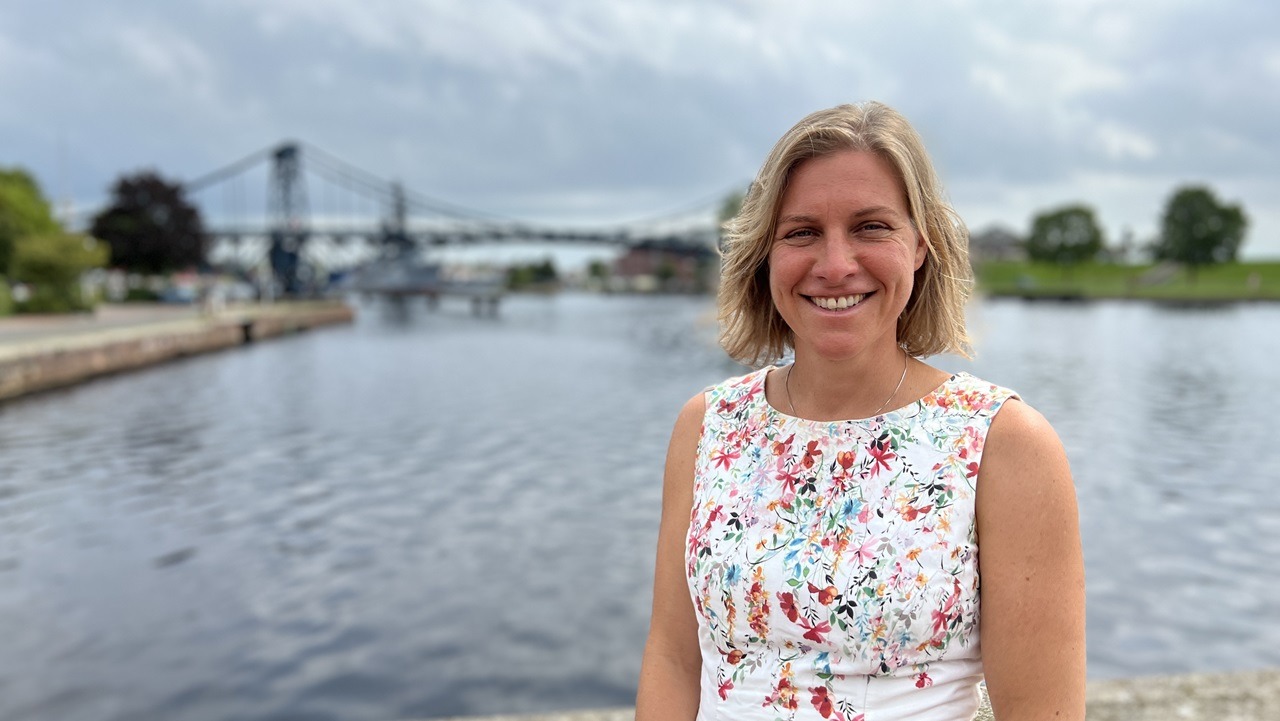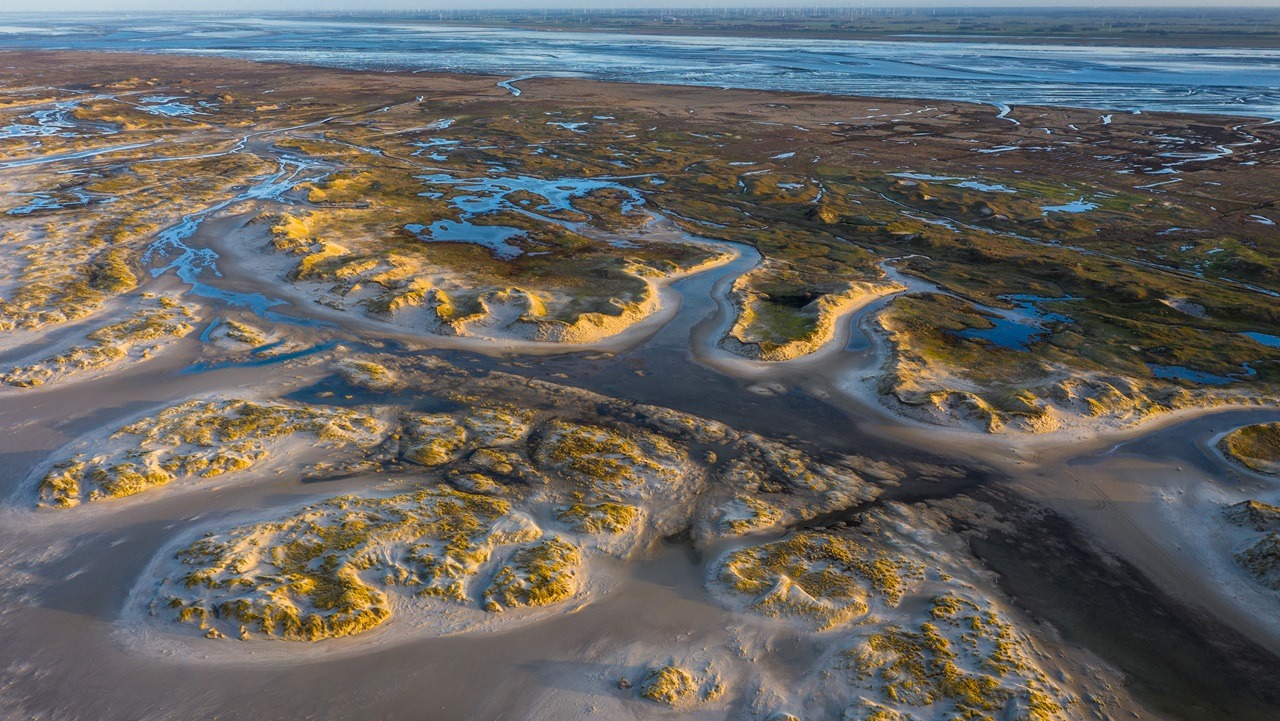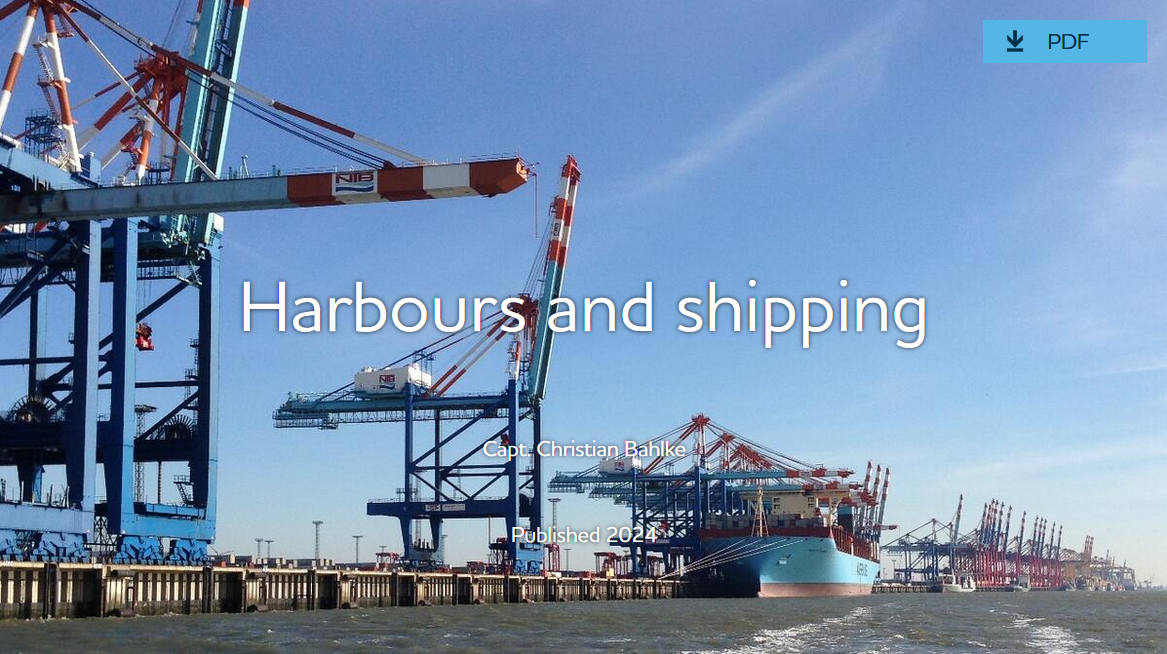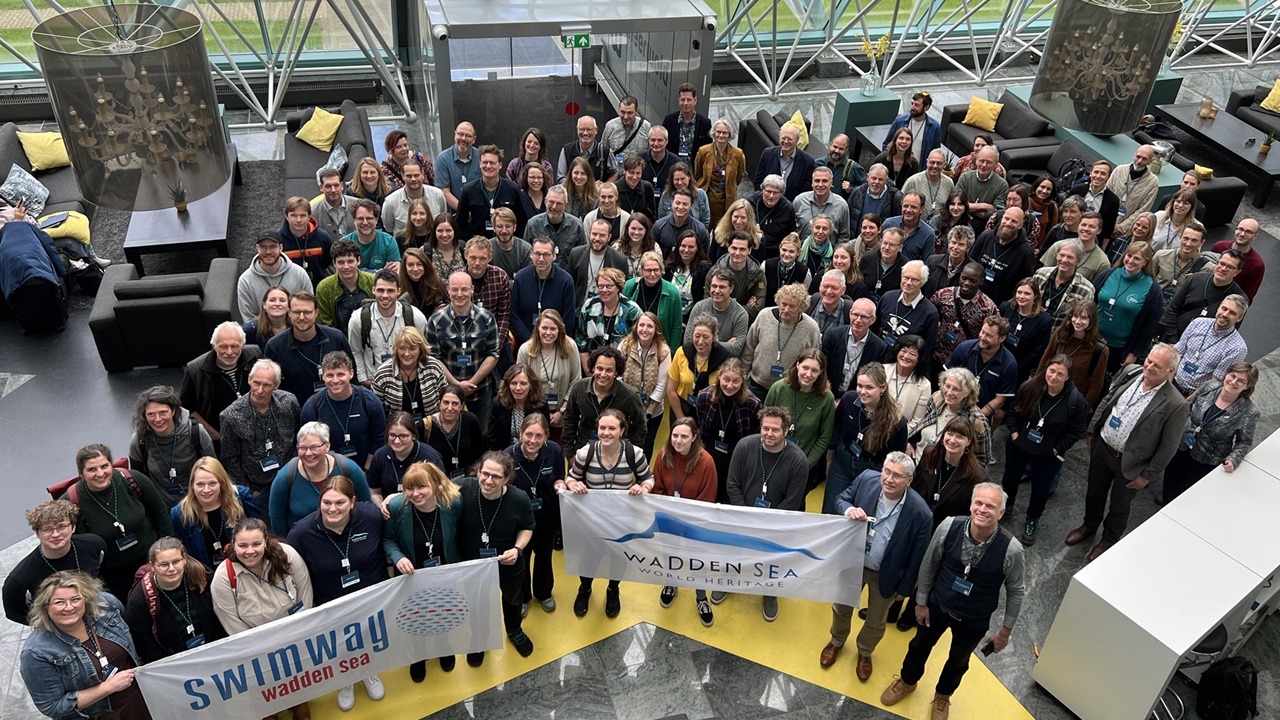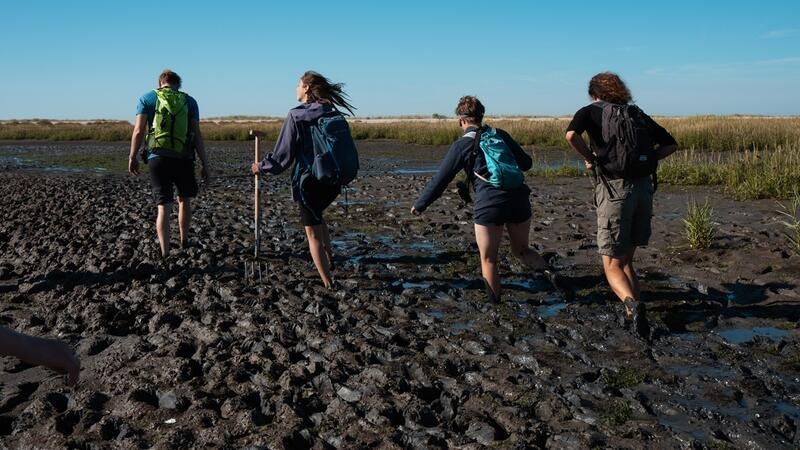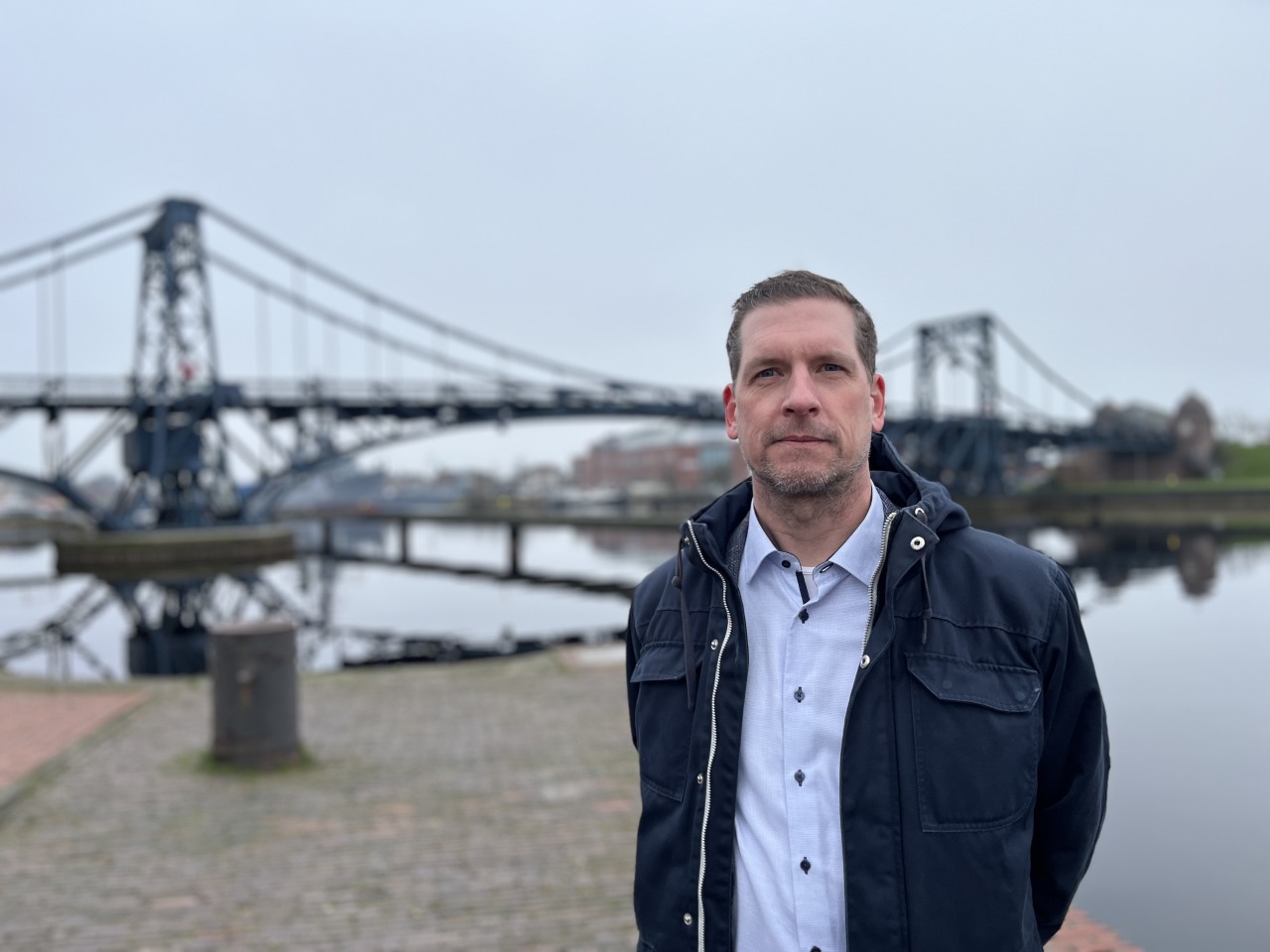News
This section gives an overview of the latest news within the networks and on the activities of the exchange platform. For further news on the Wadden Sea World Heritage and the Trilateral Wadden Sea Cooperation, visit www.waddensea-worldheritage.org or subscribe to the Wadden Sea Newsletter.
-
Call for Applications: Wadden Sea World Heritage Summer School 2025
Applications are now open for the Wadden Sea World Heritage Summer School 2025 (18-29 August). The international programme offers Bachelor’s and Master’s students the opportunity to explore the challenges of climate change, conservation, and sustainable development within our World Heritage Site.
March 10, 2025Bringing together interdisciplinary perspectives, participants will engage with leading experts in ecology, environmental science, social science, law, and economics. The programme includes:
- Introductory lectures from renowned researchers and practitioners
- On-site field visits in Denmark and Germany
- Collaboration with local stakeholders to explore real-world solutions
- International teamwork to tackle transboundary challenges
The summer school titled “Wadden Sea Under Pressure – Solving Wicked Problems in Times of Climate Change” begins in Ribe, Denmark, before traveling to Sylt, Germany, and concluding in Wilhelmshaven, Germany, where participants will attend the annual Wadden Sea Day symposium.
The programme is open to Bachelor’s and Master’s students in fields such as marine environmental studies, marine resource management, tourism management, sustainable development, geography, and related disciplines. Priority is given to students from Denmark, Germany, and the Netherlands, with two spots reserved for international participants from countries with which the Trilateral Wadden Sea Cooperation has a Memorandum of Understanding (Mauritania, South Korea, United Kingdom).
The application deadline is 15 May 2025, and participation is limited to 16 students.
Associated Networks
-
Campaign asks children to explain Wadden Sea World Heritage
Children can often explain things much better than adults can. So, together with WWF Germany and the German Wadden Sea National Park Authorities, the Common Wadden Sea Secretariat asked them:
February 14, 2025What makes the Wadden Sea a World Heritage Site? What is this ‘Outstanding Universal Value’ that UNESCO always talks about? Elementary school kids from the Norderney Biosphere School answered in five short clips now published on social media.
Special thanks goes out to the very well informed and inspiring children of Norderney!
Associated Networks
-
New Video Tutorial Series on How to Convey World Heritage Message on Guided Tours
Every year, tens of thousands of visitors discover the beauty and diversity of the Wadden Sea through guided mudflat tours. But how can guides explain the special significance of the Wadden Sea as a UNESCO World Heritage site during these tours?
February 6, 2025The International Wadden Sea School is excited to launch a new series of video tutorials designed specifically for educators and multipliers of Wadden Sea education. In this series, experienced mudflat guide and biologist Rainer Borcherding presents key insights and practical tips for conveying the unique values of the Wadden Sea.
The five videos cover essential themes such as:
- The lugworm as an example of the region's geomorphological, biophysical, and biological processes.
- The tiny laver spire shell, symbolizing the Wadden Sea's richness in biomass.
- The story behind feathers found in the driftline, highlighting the Wadden Sea's role for migratory birds.
- How to embark on a mountain hike in the flat landscape, helping visitors appreciate the area's unique perspective.
The tutorials are now available on the Wadden Sea World Heritage YouTube channel. Whether a seasoned guide or just starting out, these videos offer valuable insights and inspiration to bring the Wadden Sea's fascinating World Heritage story to life on guided tours.
The videos were produced as part of the WWF Germany project ‘What makes the Wadden Sea so valuable: Understanding and communicating the “Outstanding Universal Value” of the UNESCO Wadden Sea World Heritage Site’ and funded by the BINGO environmental lottery in Schleswig-Holstein.
Associated Networks
-
Successful conclusion of study trip for members of the Wadden Sea partner programmes
On 28-30 January over 40 stakeholders of the Wadden Sea World Heritage Site from Denmark and Germany paid a visit to their Dutch colleagues.
January 30, 2025The three-day excursion fostered collaboration and sustainable development in the region. The event was organised by Visit Wadden within the "Gastheerschap" project together with the Common Wadden Sea Secretariat as part of the ongoing activities within the trilateral Partnership Hub.
In the Netherlands, the participants visited key locations across Friesland and Groningen, gaining valuable insights into the region's sustainable initiatives and conservation efforts. The excursion featured an informative tour of Terp van de Takomst, an innovative cultural and environmental project that integrates art with nature conservation The group also explored the coastal village of Holwerd, where they experienced the impactful "Wachten op Hoog Water" art installation that reflects on climate challenges and resilience.
In Moddergat, a historic fishing village, the participants learned about local heritage projects and visited the Moddergat Museum, which preserves the village's maritime history. The excursion also included mindfulness exercises on the dike, allowing attendees to connect with the natural surroundings. The journey continued to Dokkum, where the group explored the city's rich history through a guided walk and tasting of local delicacies. The event concluded with a grand dinner at Het Lage Noorden, where hobby astronomer Koen van den Driesche will give explanation about the stars and darkness. At the final stop in Noordpolderzijl, the northernmost harbour of the Dutch mainland, expert guides provided insights into the area's ecological and cultural significance.
Associated Networks
-
Projects of Dutch-German Research Call now officially launched
Under pressure of the triple planetary crisis and human activites, the Wadden Sea needs adequate protection and preservation to maintain its Outstanding Universal Value.
January 29, 2025The Netherlands and Germany are investing 15 million euros to help gain a better understanding of the complex pressures on the Wadden Sea to inform effective protection and management of the area. Five projects were selected to study the relation between ecological changes and human usage and were now officially launched with a kick-off event in Groningen, Netherlands with over 130 researchers and stakeholders from Germany, the Netherlands, and Denmark. At the event, Sascha Klöpper, Head of the Common Wadden Sea Secretariat, introduced researchers to the Trilateral Wadden Sea Cooperation and highlighted opportunities for collaboration with regional stakeholders.
Over the next four years, these projects will explore key topics such as sediment dynamics, salt marsh processes, benthic ecology, terrestrial biology, landscape development, and legal frameworks. The findings will help shape actionable strategies and management measures to ensure the long-term sustainability of the Wadden Sea.
To foster knowledge exchange, the Common Wadden Sea Secretariat is organising a webinar to introduce the projects to a broader audience, facilitating discussions on knowledge gaps, collaboration opportunities, and the potential impact of management actions.
-
IWSS publishes bird profiles for guided tours as new educational resource
The Wadden Sea serves as a vital resting place for over ten million migratory birds a year along the East Atlantic Flyway.
January 28, 2025The Wadden Sea serves as a vital resting place for over ten million migratory birds a year along the East Atlantic Flyway. To enhance guided tours and educational efforts, the International Wadden Sea School (IWSS) has released a new collection of migratory bird profiles. This resource is designed to help bird guides and educators bring the fascinating story of migratory birds to life.
Each profile of a migratory bird species features its detailed illustration and migration map, quick facts such as information on identification, habitats, migration patterns, and diet, and the latest population figures for the flyway and the Wadden Sea region.
The collection of migratory bird profiles was first created by the Lower Saxon Wadden Sea National Park Authority. In the framework of IWSS, the product has now been adapted to a World Heritage edition for use across the Wadden Sea.
The profiles are resp. will soon be available for free download in Danish, German, Dutch, and English at iwss.org/resources.
Associated Networks
-
Report reviews outcomes of the 2024 Wadden Youth Weekend
Held on the Dutch island of Schiermonnikoog on 9 to 12 May 2024, the Wadden Youth Weekend brought together passionate young individuals from across the Wadden Sea region to explore, connect, and exchange on the values of the shared World Heritage Site.
January 20, 2025A now published report provides an overview of the event’s day-by-day programme with focus on the key outcomes from the youth perspective and feedback from the participants.
The weekend was filled with engaging workshops, field activities, and meaningful discussions of different perspectives and values of the Wadden Sea. Participants shared their ideas as a vital step for developing a Trilateral Youth Network.
Associated Networks
-
Registration opened for online introduction to new Wadden Sea research projects
The Common Wadden Sea Secretariat and Waddenacademie invite stakeholders to an online presentation of the five projects under the Dutch-German Wadden Sea research call on 20 February 2025.
December 11, 2024The event is designed to foster collaboration between Wadden Sea researchers and stakeholders from various disciplines and regions, contributing to the effective preservation and management of this unique natural World Heritage Site.
The Wadden Sea, the largest tidal flats system in the world, faces significant challenges due to the triple planetary crisis. In response, the Netherlands and Germany have committed €15 million to support groundbreaking research into the complex interplay between ecological changes and human activities. Five research projects have been selected under a bilateral research call. These projects will investigate sedimentary dynamics, saltmarsh processes, benthic ecology, terrestrial biology, landscape studies, and legal frameworks, aiming to chart options for action and develop sustainable management strategies.
The webinar provides an opportunity for stakeholders to engage with the researchers and learn about the scope and goals of these projects. The meeting will begin with a presentation on the research call, followed by project pitches and discussions. Participants will have the chance to explore knowledge gaps, identify collaboration opportunities, and discuss the potential impact of proposed management actions. This interactive exchange is crucial to ensure that the research and resulting strategies are realistic, effective, and sustainable.
The final agenda for the event will be available in early 2025. Stakeholders from various sectors are encouraged to join this vital conversation about the future of the Wadden Sea and contribute their insights to this collaborative effort.
-
Conference report highlights conclusions of trilateral experts on migratory fish research
Held on 17-19 April 2024 in Groningen, Netherlands, the second Trilateral Swimway Conference and 32nd Waddenacademie Symposium set a focus on understanding and preserving diverse fish life cycles in the world's largest tidal flats system.
December 9, 2024The event featured the latest research advancements alongside discussions on practical measures to uphold and restore the viability of fish populations within the Wadden Sea. The now published conference report contains information on the programme and excursions, as well as an overview on contents of the thematic sessions and conclusions.
The Swimway conference series is part of the Swimway Wadden Sea Initiative. Swimway Wadden Sea is an overarching approach - an umbrella – for a wide variety of initiatives related to achieving trilateral fish targets, aiming at improving the situation for fish in the Wadden Sea.
Associated Networks
-
Report reflects on Ten Years of Capacity Building along the East Atlantic Flyway
It has been ten years since the Wadden Sea Flyway Initiative (WSFI) first started its capacity building and management programme, which takes place mostly along the African part of the East Atlantic Flyway.
November 7, 2024A report, authored by capacity building trainer, Tim Dodman, is out today. The report provides country profiles where the work has been carried out, describes the activities, projects, workshops over the last decade as well as highlighting a key publication of the initiative: the WSFI African East Atlantic Flyway Guide. The report also puts a spotlight on some of the people and partners who have worked with the initiative and provided their perspective and reflections on what capacity building means to them.
Associated Networks
-
First trilateral summer school on Wadden Sea World Heritage a success
After ten days of learning about the Wadden Sea World Heritage Site and the intricate aspects of its ecology, nature conservation, sustainable development, and management, the trilateral summer school is coming to an end.
August 30, 2024Through theoretical lectures, field visits, and collaborated solution-seeking, 18 Bachelor’s, Master’s, and PhD students from the Wadden Sea countries and abroad investigated the multifaceted challenges the Wadden Sea faces. The summer school participants presented their results in the framework of yesterday’s annual Wadden Sea Day.
Cristina Nazzari, co-organiser from the Common Wadden Sea Secretariat: “With the enthusiastic feedback we’ve received, I believe we succeeded not only in educating on the complexities of Wadden Sea conservation, management, and governance, but also in providing a platform to engage with active professionals. We hope that this school helped foster a community of future leading guardians of natural world heritage.”
The next summer school is planned to be held in Denmark, on the German Island of Sylt, and in Wilhelmshaven on 18.08 to 29.08.2025. The Wadden Sea World Heritage Summer School 2024 was a joint initiative of Alfred Wegener Institute, the FH Westküste University of Applied Sciences, the Common Wadden Sea Secretariat, the Lower Saxon Wadden Sea National Park Authority, the Danish Wadden Sea National Park, and the Waddenacademie, supported by the Trilateral Programming Committee on Wadden Sea Research and the Partnership Hub within the framework of the Trilateral Wadden Sea Cooperation.
Associated Networks
-
Experts discuss Wadden Sea protection in face of green energy developments
More than 120 representatives from science, nature conservation, and politics met in Wilhelmshaven for the 2024 Wadden Sea Day titled “Safeguarding the Wadden Sea: Navigating Green Energy Development in the North Sea.”
August 29, 2024A World Heritage Site for 15 years, the Wadden Sea is renowned for its unique biodiversity and crucial role in global ecological processes. Safeguarding its outstanding universal value stands at the core of the Trilateral Wadden Sea Cooperation of Denmark, Germany, and the Netherlands. Located between mainland and North Sea, the Wadden Sea is becoming a transit zone between offshore green power plants and consumers on land. The Wadden Sea Day 2024, held on 29 August at the UNESCO Wadden Sea World Heritage Visitor Centre Wilhelmshaven, focussed on the prospects of developing the North Sea as Europe's green power plant and what this means for the Wadden Sea World Heritage Site.
“We need to use the best technologies and practices to protect the natural values of the Wadden Sea World Heritage Site and to achieve the energy transition goals” says Sascha Klöpper, Executive Secretary of the Common Wadden Sea Secretariat. “While energy transition is an important element in mitigating climate change – an existential threat to the Wadden Sea, the developments in its proximity will add to the pressures of human activities on the World Heritage Site. In their decisions of 2023 and 2024 the UNESCO World Heritage Committee raised concerns regarding the consequences of these external and internal developments on the property – concerns that we need to address jointly with our partners.”
This year’s Wadden Sea Day is one step towards a better joint management and addressed questions such as what is needed to develop the North Sea as Europe’s green power plant, what are the potential impacts on the Wadden Sea, how can these challenges be managed, how can impacts be minimised, how can good spatial and technical solutions be found and how can common approaches be adopted.
The Wadden Sea Day has been jointly organised by the Common Wadden Sea Secretariat and the Lower Saxon Wadden Sea National Park Authority since 2006.
Associated Networks
-
Antonia Immerz takes on monitoring and assessment at the Common Wadden Sea Secretariat
With the start of August, the Common Wadden Sea Secretariat (CWSS) welcomed a new staff member.
August 7, 2024Antonia Immerz takes on the position of the Project Officer Monitoring and Assessment. Her tasks include coordinating and managing the Trilateral Monitoring & Assessment Programme (TMAP) and the Quality Status Report as well as facilitating the Expert Groups Monitoring & Assessment and Data Handling.
Antonia has just returned from South Africa, where she researched for her master's thesis on humpback whales at the MRI Whale Unit of the University of Pretoria. With a background in computer science, Antonia supported marine research at the Alfred Wegener Institute, Helmholtz Centre for Polar and Marine Research in Bremerhaven for over 11 years. There, she was the overall responsible data manager for the MOSAiC project and on board the multidisciplinary and international Arctic drift experiment herself.
“I feel honoured to take on the new tasks at CWSS. I am excited to learn all about the diverse and ambitious endeavours for the protection of the Wadden Sea. I am delighted to say that I have already seen a harbour porpoise in Wilhelmshaven, and I am looking very much forward to meeting you all and working with you soon”, Antonia says.
The CWSS team welcomes Antonia and wishes her a great start!
-
World Heritage Committee adopts Decision regarding the state of conservation of the Wadden Sea World Heritage Site
During their 46th session, 21-31 July 2024 in New Delhi, the UNESCO World Heritage Committee adopted a report and decision regarding the Wadden Sea World Heritage Site prepared by the World Heritage Centre and International Union for Conservation of Nature (IUCN).
July 25, 2024In the Decision WHC/24/46.COM/7B.Add.3 adopted on 25 July 2024, the World Heritage Committee acknowledged the joint response submitted by the three Wadden Sea states in February 2024 to the Committee’s last year’s requests. It also welcomed the progress made by the states in jointly developing a Strategic Environmental Assessment (SEA) to assess the cumulative impacts. The aim of the SEA is to examine the consequences and cumulative impacts of future programmes, plans and projects on the Outstanding Universal Value (OUV) of the World Heritage Site. The process of this complex task remains ongoing. The results should serve as a basis for future decisions. Finally, the Committee repeated concerns about the cumulation of plans and projects with potential negative impacts within, nearby or beneath the Wadden Sea World Heritage Site and requested the State Parties of Denmark, Germany, and the Netherlands to provide further and comprehensive information on specific issues.
Sascha Klöpper, Common Wadden Sea Secretariat: “I also share the raised concerns. Human activities in and around the Wadden Sea are not new, but the needed acceleration to reach the commitments for energy transition, the geopolitical situation in addition to other human uses and the effects from climate change like sea level rise have significantly increased the pressure on the ecosystem.”
The Trilateral Wadden Sea Cooperation of Denmark, Germany and the Netherlands supported by the Common Wadden Sea Secretariat will prepare a joint report to address the World Heritage Committee’s requests and respond to the raised concerns.
With the nomination of the Wadden Sea as a World Heritage Site, Denmark, the Netherlands, and Germany, all parties to the World Heritage Convention, have committed themselves to their duty to ensure the conservation of the Outstanding Universal Value of the World Heritage Site. With the Trilateral Cooperation to protect the Wadden Sea commonly since 1978, the three Wadden Sea States enjoy a long tradition of safeguarding the ecosystem.
Associated Networks
-
Experts call for holistic approach when looking at carbon sequestration in Wadden Sea
The Wadden Sea has significant potential for carbon sequestration, yet the precise contribution of specific habitats to greenhouse gas reduction has not been quantified on a trilateral scale.
July 9, 2024As climate change accelerates, there is growing interest in evaluating the CO2 sequestration capabilities of the Wadden Sea. To initiate a collaborative exchange on carbon sequestration in salt marshes, seagrass meadows, sediments, and mussel beds, over 50 experts from the three Wadden Sea countries and beyond attended the Common Wadden Sea Secretariat's trilateral workshop titled "CO2 Sequestration in the Wadden Sea: State of Knowledge and Open Questions."
Extensive knowledge at national or local levels presents an opportunity to scale up estimates to the ecosystem level. The workshop commenced with several presentations on carbon cycling and storage in the Wadden Sea. These findings underscored the necessity of meticulously assessing carbon sequestration across different habitats and regions, while also identifying specific knowledge gaps, particularly concerning human use and varying management regimes.
During the discussions, two groups focused on identifying critical knowledge gaps and potential threats, as well as opportunities related to carbon sequestration in the Wadden Sea. A recurring theme was the need for a holistic approach, recognizing that carbon sequestration is only one of several ecosystem services provided by Wadden Sea habitats. Management strategies aimed at enhancing carbon storage should not negatively impact other aspects such as biodiversity conservation or coastal protection. Additionally, it was emphasised that the rate of carbon sequestration in Wadden Sea habitats is much lower than the current rate of carbon emissions from the three countries, underscoring the urgent need for emission reductions. Preventing the release of old carbon from natural sources was also highlighted as a critical consideration.
Associated Networks
-
New status report on harbour and shipping operations in the Wadden Sea
Shipping and harbour operations are an important economic factor throughout the Wadden Sea, both domestically and internationally.
May 29, 2024However, these activities also pose challenges to its dynamic ecosystem, for instance, by introducing alien species, emitting noise, pollutants, and greenhouse gases, or induce risks through accidents such as the recent Freemantle Highway incident. As part of the ongoing Wadden Sea Quality Status Report (QSR) gathered within the Trilateral Wadden Sea Cooperation, a comprehensive update of the thematic report on harbours and shipping has been published examining the status and evolution of these sectors.
Despite international rules and pressure to reduce carbon emissions and minimise ecological impacts of shipping and harbour operations, Captain Christian Bahlke emphasises in his report the need for urgent action to address these risks to effectively protect the Wadden Sea World Heritage Site. It suggests reviewing regulations in the Particularly Sensitive Sea Area against current shipping trends, such as increased traffic and larger vessels. Additionally, it recommends considering new or improved technical and operational safety devices and measures.
While managing international shipping is complex, the report sees opportunities for countries to make proactive decisions regarding domestic shipping and harbour operation. As stewards of the Wadden Sea, stakeholders are urged to collaborate on balancing economy and conservation to safeguard the fragile ecosystem for present and future generations.
The Wadden Sea Quality Status Report is a conglomeration of thematic reports reflecting the continuous monitoring and evaluation of the ecological status of the Wadden Sea, including reports with focus on human activities. Openly accessible at qsr.waddensea-worldheritage.org, it forms the baseline for the identification of emerging and review of existing challenges of new emerging challenges. As part of the Trilateral Monitoring and Assessment Programme, the QSR helps identify and fill knowledge gaps and priorities for the improvement of the ecological status of the Wadden Sea World Heritage Site.
The compiled information feed into the agreements of the Trilateral Cooperation. In 2024, the QSR is expected to receive further updates on fisheries and salt marshes. An update on climate change was published in February 2024.
The content of the report is the sole responsibility of the author and does not reflect the position of the Trilateral Governmental Cooperation for the Protection of the Wadden Sea (TWSC), its member organisations, or the Common Wadden Sea Secretariat (CWSS).
Associated Networks
-
Five applications awarded for research about the Wadden Sea
The Netherlands and Germany have invested 15 million euros in five research projects that will study the relation between sediment, ecology, human co-use, flood safety and effective protection and management in the Wadden Sea.
May 22, 2024The Wadden Sea is a unique system of living organisms, tides and sediments. It is a natural World Heritage Site situated at the doorstep of three industrial nations and under pressure of the triple ecological crisis. It is an area that needs adequate protection and preservation to maintain its Outstanding Universal Value.
The bilateral German-Dutch research projects will help gain a better understanding of the complex pressures on the Wadden Sea. They will also pave the road to societal impact by charting options for action and developing strategies for management measures. In addition, the programme is an investment in a new generation of Wadden experts, as well as a new bridge between countries, disciplines, institutes and types of stakeholders. In the next four years, the projects are going to combine a focus on sedimentary dynamics and saltmarsh processes with benthic ecology, terrestrial biology, landscape and legal design. They are all set to improve our current understanding of the Wadden Sea and work towards a systemic view of this wild (eco)system.
The five granted projects:
- PaRCA. Pathways for Realising Climate Adaptation in the Wadden Sea
- SedWay. Safeguarding the natural sedimentary processes in the Wadden Sea for biodiversity and people
- TRICMA². Triple crisis meets trilateral cooperation: Effects of biodiversity loss, climate change and pollution on salt marshes & pathways to their sustainable management
- SALTGARDEN. Sustainable Adaptive Landscapes through Transdisciplinary Gardening to Advance the Resilience and Dynamics of our Ecological Natural-heritage
- WADWAD. WAD was - WAD can we do? Action plan for ecosystem-based land-sea transition zones
This programme is an initiative of the Netherlands and the Federal Republic of Germany. The programme received its funds from BMUV, BMBF, LBV, IenW, EZK, Waddenfonds and the Dutch Research Agenda. The assessment was undertaken by an independent committee of 23 experts chaired by em.prof.dr. Karin Lochte, former director of the Alfred-Wegener-Institute and 2028-2022 Chair of the Wadden Sea Board.
-
International conference on fish migration research in the Wadden Sea concluded
150 leading fish migration experts from the Wadden Sea region gathered in Groningen, Netherlands, from 17-19 April 2024 for the second Trilateral Swimway Conference.
April 19, 2024Dedicated to understanding and preserving diverse fish life cycles in the world's largest tidal flats system, the symposium featured the latest research advancements alongside discussions on practical measures to uphold and restore the viability of fish populations within the Wadden Sea. Today, the 3-day event, which was set within the Waddenacademie Symposium series, was concluded with a discussion on how to tackle the multifaceted challenges confronting migrating fish through management.
“At this conference experts from various disciplines were given a platform to discuss the most recent scientific research and new insights on management measures”, says Paddy Walker, Chair of the Expert Group Swimway of the Trilateral Wadden Sea Cooperation. “Our symposium highlighted how important it is to consider the ecosystem and its inhabitants as a whole and how significant it is to preserve and restore natural dynamics in the Wadden Sea for us all.”
“The health of our trilateral migratory fish strongly relies on the connectivity between open sea, the Wadden Sea, and inland waters”, adds Katja Philippart, Director of the Waddenacademie. “Knowledge on the relationships between these pathways and the needs of fish during different phase in their life cycle is crucial for effectively addressing present and future hurdles along their way.”At the conference, the experts concluded that the visibility of fish as an essential component of the Wadden Sea has drastically improved since 2019, when the inaugural Swimway Conference was held. In order to protect fish in this World Heritage Site, there is a common understanding that it is essential to continue protecting and improving their environment. Further, science has progressed in the persist to provide information on potential management measures. During the conference, authorities, stakeholders, and managers shared the sense of urgency to jointly act based on our current state of knowledge.
The translation of scientific knowledge to management actions, where conferences such as this one play a major role, can lead to measurable improvement for fish. The process is a cornerstone of the Trilateral Wadden Sea Cooperation’s Swimway-Vision built on research and monitoring, policy, measures, stakeholder involvement, and communication and education.
The 2024 Swimway Conference was organised by the Trilateral Expert Group Swimway, the Common Wadden Sea Secretariat (CWSS), Waddenacademie, Waddenvereniging, the University of Groningen, Wageningen Marine Research, van Hall Larenstein University, Danish National Park Wadden Sea, and Danish Ministry of Environment in the framework of the Trilateral Wadden Sea Cooperation. The next Swimway conference is expected to be organised in Denmark in three years’ time.
Associated Networks
-
First Wadden Sea World Heritage summer school opens registration
The Wadden Sea World Heritage Summer School, to be held in August 2024, has now officially opened registration for its upcoming event.
April 4, 2024The educational programme offers an in-depth exploration of ecology, nature conservation, sustainable development, and management, specifically centered around the unique ecological context of the Wadden Sea.The event is a joint initiative of AWI, the FH Westküste, the Common Wadden Sea Secretariat, the National Park Authority “Niedersächsisches Wattenmeer”, the Vadehavet National Park, and the Waddenacademie, supported by the Trilateral Wadden Sea Cooperation.
The interdisciplinary curriculum of the summer school includes environmental and social sciences, economics, and governance. The sessions address multifaceted challenges for the Wadden Sea and encourage a collaborative approach among participants to formulate solutions. The 10-day programme commences in Emden and ends with the 2024 Wadden Sea Day in Wilhelmshaven. The majority of time is spent on the island of Borkum encompassing a series of expert-led lectures as well as topic-related field visits.
Master and (early) PhD students can now apply for the summer school until 15 May. For all enquiries regarding the Summer School please contact: Cristina Nazzari, Common Wadden Sea Secretariat at nazzari@waddensea-secretariat.org
The Wadden Sea World Heritage Summer School is a cooperation between the Trilateral Programming Committee for Wadden Sea Research and the Partnership Hub.
-
Sascha Klöpper appointed as new Executive Secretary of the Common Wadden Sea Secretariat
The Trilateral Wadden Sea Cooperation of Denmark, Germany, and the Netherlands has appointed Sascha Klöpper as new Executive Secretary of the Common Wadden Sea Secretariat (CWSS). Klöpper will officially take office on 1 March 2024.
February 28, 2024With a background in marine biology, Klöpper brings over a decade of experience within CWSS. He spearheaded the transition of the Wadden Sea Quality Status Report to an accessible online platform, enhancing transparency and accessibility of crucial environmental data. As secretary of the Trilateral Programming Committee Wadden Sea Research he has been a driving force in strengthening collaboration with the scientific community. For several years he has served as Deputy Executive Secretary. Since the term end of Bernard Baerends in June 2023, he has held the position of the Executive Secretary on an interim basis.
The selection committee, consisting of representatives of the Cooperation’s three member states and Anne-Marie Vægter Rasmussen, Chair of the Wadden Sea Board, gives the following statement on Klöpper’s appointment: “We are delighted that we have filled the Executive Secretary position with someone who is an exact fit with the competences required for this task. Sascha will be able to further develop the Secretariat’s team and its tasks in view of the current and future challenges for the Wadden Sea World Heritage Site for the benefit of the property and the Cooperation. With his broad expertise and engaging manner, he has contributed greatly to the Secretariat's current performance as a trustworthy partner. Sascha is also very well known, experienced, and appreciated in the Wadden Sea community. Since summer, Sascha has led CWSS with great competence and commitment. He has proven to work with the Board, partners, and stakeholders in a reliable and inspiring way. We are looking forward to cooperating with Sascha in his new role as well as with our partners and stakeholders in the Wadden Sea community.”
“I am very excited to move into the position as Executive Secretary”, says Klöpper. “Even though, I have had some practice already in the past months as interim, now I can fully immerse myself in strengthening CWSS as a vibrant team and as the first point of contact of the Trilateral Wadden Sea Cooperation. I look forward to working with our member organisations and partners from this new position.”
The Common Wadden Sea Secretariat supports, facilitates, and coordinates the Trilateral Wadden Sea Cooperation. Located in Wilhelmshaven, the Secretariat was founded in 1987 by the Wadden Sea states Denmark, Germany, and the Netherlands. Further, CWSS is the secretariat of the Wadden Sea Seals Agreement, the first regional Agreement to be concluded under the auspices of the Convention on the Conservation of Migratory Species of Wild Animals (CMS). It also deals with the implementation of the obligations derived from the UNESCO World Heritage Convention.
Associated Networks
